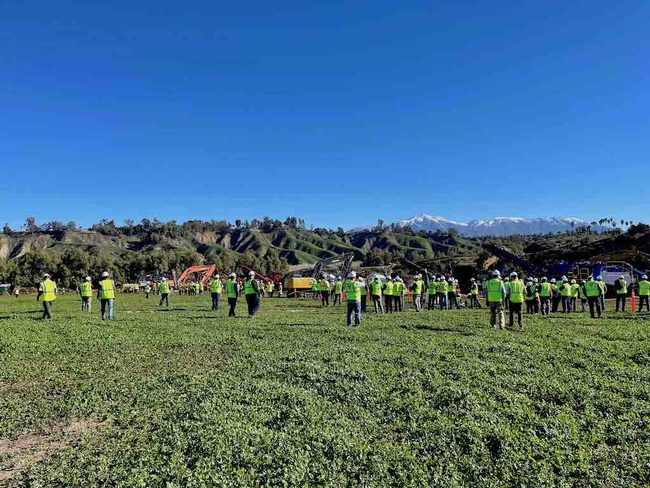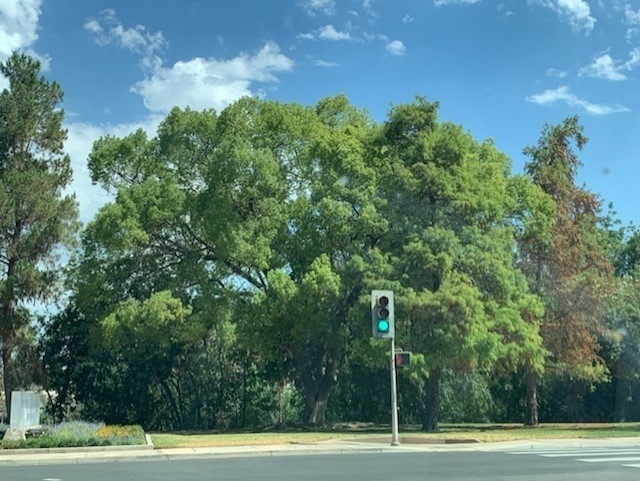Posts Tagged: Composting
UCCE popularizes at-home composting in Santa Clara County
Composting Education Program helps repurpose waste, reduce methane emissions
Composting recycles organic matter such as leaves and food scraps into a valuable soil amendment. Vermicompost produced by worms offers numerous benefits for plants, such as boosting their growth and making them more resistant to disease and insects than plants grown with other composts or fertilizers. University of California Cooperative Extension in Santa Clara County is helping to make composting a go-to strategy for diverting household organic waste from landfills and supporting soil health.
Based at Martial Cottle Park in San Jose, UCCE's Composting Education Program is a volunteer-driven program that educates and supports Santa Clara County residents in composting. The project is funded by the Recycling and Waste Reduction Commission of Santa Clara County, the principal advisory body to councils and the Board of Supervisors on countywide solid waste planning issues, through the tipping fees collected by the county when garbage is hauled to waste processing facilities. By offering public education on organic waste diversion, the program is helping the county fulfill its SB 1383 requirements.
Master Composter volunteers trained by UCCE experts offer free compost workshops, K-12 school visits and table at community events to teach backyard and worm composting. On volunteer workdays, community members help to maintain the compost stations. In 2023, the program engaged nearly 5,000 students, residents and volunteers in educational activities.
Volunteer and Master Composter Jack Carter values the circular nature of the composting system, with materials going from kitchen to compost bin to worms to garden – and then back into the kitchen. He emphasized that composting is a simple way to boost soil health and something every resident can do.
“It takes organic material that we would throw away and makes amendments to build our soil up,” he said. “It's easy if we follow some simple rules and it's fun because you watch things change into what you can use. Easy-peasy – everyone can do it.”
Unique location provides unmatched opportunities
Martial Cottle Park contains the last farmland within the City of San Jose. Established by Edward Cottle in 1856 and continually maintained and farmed by his descendants until 2014, the land remained in agricultural production for over 150 years. The 287-acre site was then donated to provide a place where people in the community could learn about agriculture and celebrate the agricultural roots of the county.
“We have lots of hands-on opportunities for compost education, gardening and youth development here,” said Sheila Barry, UCCE county director in Santa Clara County.
The compost is used at the nearby UC Master Gardener demonstration garden and the adjacent open field – used for 4-H youth development animal husbandry projects – provides manure for the vermicomposting site. “Some of the youths are not so happy about how far they have to cart it,” she joked, “but it's incorporated into our really great compost product.”
Victoria Roberts, coordinator for the Composting Education Program, said the composting location comprises a variety of features.
“We've got a worm farm, backyard composting stations, and there's even a bicycle trommel that we're working on to sift finished compost,” she explained. “As you spin the bike, you're sifting the large chunks from the compost to make a fine, delicious earthy material that we get to use on our plants.”
The worm farm is maintained on the community volunteer workdays. “We're feeding the worms and giving them their habitat material with shredded newspaper,” said Roberts. “It's a way for us to recycle paper and help the worms live their most productive lives.”
Program helps community see ‘waste' as resource
UCCE Organic Materials Management Advisor Michael Cohen shared a broader view of the organic waste system and Cooperative Extension's work in this area. “The goal is to find valuable uses for what we call organic waste and see it not as waste, but as a resource,” he said.
He also noted other valuable uses of organic material beyond composting.
“One thing you can do with food waste instead of composting it is to dehydrate it – there are even industrial machines that dehydrate it and grind it into powder, which retains all that food energy that can be incorporated into the soil,” Cohen said. “And if you tarp the soil, you can generate an anaerobic environment where microbes consume the oxygen.”
Cohen is planning collaborative research with the Hansen Agricultural Research and Extension Center, UCCE Strawberry and Vegetable Crop Advisor Oleg Daugovish, and UCCE Specialist Joji Muramoto that will examine the use of vermicompost – in combination with steaming soil – to create a microbial community that suppresses Fusarium wilt in strawberries.
Cohen stressed the importance of diverting food waste from landfills to reduce methane emissions and to comply with Senate Bill 1383 that requires 75 percent of organic waste be diverted for other uses by 2025. “The Santa Clara County food waste diversion program is operating quite well in getting food- and yard waste-derived compost to farmers,” he said.
He also noted that proliferation of at-home composting through programs like theirs will help ease the environmental burdens of centralized composting, such as truck emissions and wear and tear on the roads. “There are many uses for organic materials at home – in your yard, in your potting soil, as a top dressing on your lawn,” he said. “You can even do vermicomposting on a small scale in an apartment.”
Growth suggests a promising future
Roberts, the program coordinator, is excited about the year ahead, noting that they will be “doing more hands-on workshops and demonstrations and reaching out to more schools.” She said that every city in the county works with the program on food-waste reduction educational initiatives.
“There's really nothing else like this place in the area, and we're continuing to grow,” Barry added. “We have a great corps of volunteers from our Master Gardener Program and our Composting Education Program, and our Youth Development Program is also growing. Youth in an urban area who would never have had an opportunity to interact with and raise an animal have that opportunity here.”
Any member of the community can volunteer to support the Composting Education Program, from feeding the worms to shredding paper or turning compost piles. There are also opportunities for residents to drop off kitchen and yard waste throughout the year. Learn more at https://cesantaclara.ucanr.edu/Home_Composting_Education.
Lawn-pocalypse! Surviving Drought
Ah, summer! The season of sunburns, pool parties, and… lawn droughts. If your once lush, green carpet now looks like a crunchy brown doormat, you're not alone. Let's dive into why your yard is staging a dramatic death scene and what you can do to...

Bermuda grass and weeds overtaking drought stressed turf grass.
Debbie's Diary: Trash Talk - A Tour of Lamb Canyon Landfill
—— On September 28th, a group of eleven Master Gardeners from San Bernardino and Riverside Counties took a bus tour of Lamb Canyon Landfill in Beaumont. The tour, coordinated by Janet Moreland, a Supervising Recycling Specialist with...
Climate-Change Resources
University of California UC ANR Green Blog (Climate Change and Other Topics) https://ucanr.edu/blogs/Green/index.cfm?tagname=climate%20change (full index)
Examples:
- Save Trees First: Tips to Keep Them Alive Under Drought https://ucanr.edu/b/~CdD
- Landscaping with Fire Exposure in Mind: https://ucanr.edu/b/~G4D
- Cities in California Inland Areas Must Make Street Tree Changes to adapt to Future Climate https://ucanr.edu/b/~oF7
Drought, Climate Change and California Water Management Ted Grantham, UC Cooperative Extension specialist (23 minutes) https://youtu.be/dlimj75Wn9Q
Climate Variability and Change: Trends and Impacts on CA Agriculture Tapan Pathak, UC Cooperative Extension specialist (24 minutes) https://youtu.be/bIHI0yqqQJc
California Institute for Water Resources (links to blogs, talks, podcasts, water experts, etc.) https://ciwr.ucanr.edu/California_Drought_Expertise/
UC ANR Wildfire Resources (publications, videos, etc.) https://ucanr.edu/News/For_the_media/Press_kits/Wildfire/ (main website)
-UC ANR Fire Resources and Information https://ucanr.edu/sites/fire/ (main website)
-Preparing Home Landscaping https://ucanr.edu/sites/fire/Prepare/Landscaping/
UC ANR Free Publications https://anrcatalog.ucanr.edu/ (main website)
- Benefits of Plants to Humans and Urban Ecosystems: https://anrcatalog.ucanr.edu/pdf/8726.pdf
-Keeping Plants Alive Under Drought and Water Restrictions (English version) https://anrcatalog.ucanr.edu/pdf/8553.pdf
(Spanish version) https://anrcatalog.ucanr.edu/pdf/8628.pdf
- Use of Graywater in Urban Landscapes https://anrcatalog.ucanr.edu/pdf/8536.pdf
- Sustainable Landscaping in California https://anrcatalog.ucanr.edu/pdf/8504.pdf
Other (Non-UC) Climate Change Resources
Urban Forests and Climate Change. Urban forests play an important role in climate change mitigation and adaptation. Active stewardship of a community's forestry assets can strengthen local resilience to climate change while creating more sustainable and desirable places to live. https://www.fs.usda.gov/ccrc/topics/urban-forests
Examining the Viability of Planting Trees to Mitigate Climate Change (plausible at the forest level) https://climate.nasa.gov/news/2927/examining-the-viability-of-planting-trees-to-help-mitigate-climate-change/
Reports and other information resources coordinated under the auspices of the United Nations and produced through the collaboration of thousands of international scientists to provide a clear and up to date view of the current state of scientific knowledge relevant to climate change. United Nations Climate Action
Scientific reports, programs, action movements and events related to climate change. National Center for Atmospheric Research (National Science Foundation)
Find useful reports, program information and other documents resulting from federally funded research and development into the behavior of the atmosphere and related physical, biological and social systems. Search and find climate data from prehistory through to an hour ago in the world's largest climate data archive. (Formerly the "Climatic Data Center") National Centers for Environmental Information (NOAA)
Think tank providing information, analysis, policy and solution development for addressing climate change and energy issues (formerly known as the: "Pew Center on Global Climate Change"). Center for Climate & Energy Solutions (C2ES)
Mapping Resilience: A Blueprint for Thriving in the Face of Climate Disaster. The Climate Adaptation Knowledge Exchange (CAKE) was launched in July 2010 and is managed by EcoAdapt, a non-profit with a singular mission: to create a robust future in the face of climate change by bringing together diverse players to reshape planning and management in response to rapid climate change. https://www.cakex.org/documents/mapping-resilience-blueprint-thriving-face-climate-disaster
Cal-Adapt provides a way to explore peer-reviewed data that portrays how climate change might affect California at the state and local level. We make this data available through downloads, visualizations, and the Cal-Adapt API for your research, outreach, and adaptation planning needs. Cal-Adapt is a collaboration between state agency funding programs, university and private sector researchers https://cal-adapt.org/
Find reports, maps, data and other resources produced through a confederation of the research arms of 13 Federal departments and agencies that carry out research and develop and maintain capabilities that support the Nation's response to global change. Global Change (U.S. Global Change Research Program)
The Pacific Institute is a global water think tank that combines science-based thought leadership with active outreach to influence local, national, and international efforts to develop sustainable water policies. https://pacinst.org/our-approach/
Making equity real in climate adaptation and community resilience policies and programs: a guidebook. https://greenlining.org/publications/2019/making-equity-real-in-climate-adaption-and-community-resilience-policies-and-programs-a-guidebook/
Quarterly CA Climate Updates and CA Drought Monitor Maps (updated each Thursday) https://www.drought.gov/documents/quarterly-climate-impacts-and-outlook-western-region-june-2022
Debbie’s Diary: Composters Convene at COMPOST2023 Conference - Part 2
In my previous blog, I gave an overview of the first two days of COMPOST2023. The event, hosted by the The US Composting Council in January, was an outstanding learning and networking experience. In Part 2, I'm excited to discuss the rest of the...

Demo Day Showcase Smaller





